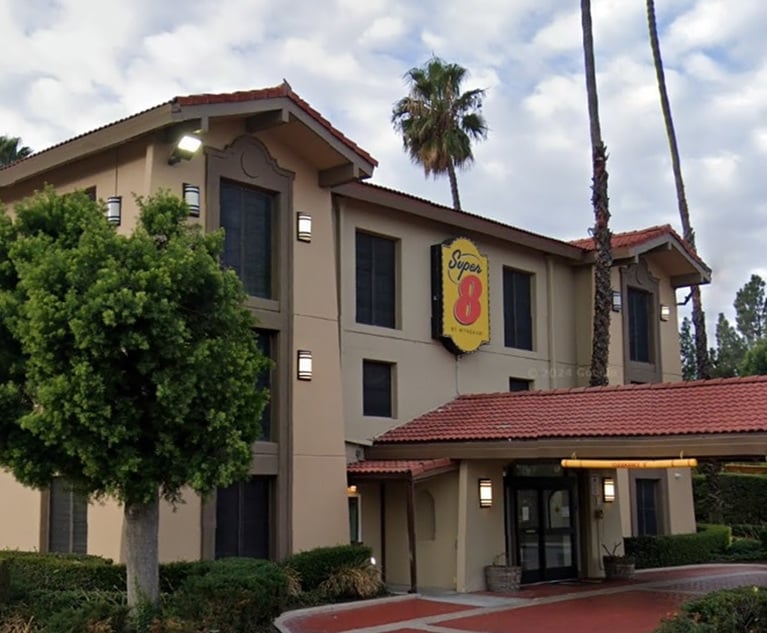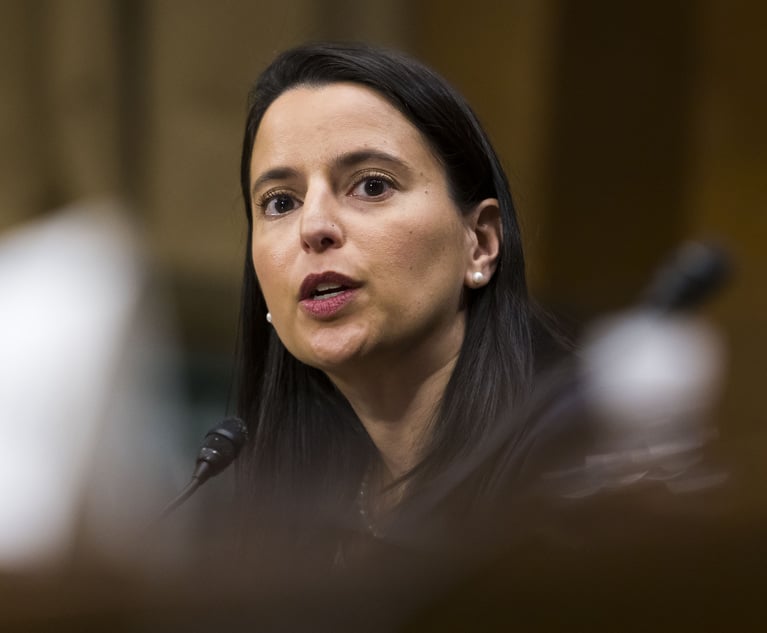Sacramento Judge Puts the Jeff Sessions Suit Against California on Trial
The hearing, more than five hours long, resembled a trial at times. Mendez dove into minute details of the case, asking lawyers for relevant case law, citing arguments in the numerous amicus briefs, questioning the severability of provisions in each statute and quizzing the sides with long lists of what appeared to be prepared questions.
June 20, 2018 at 06:39 PM
4 minute read
 Attorney General Jeff Sessions announces the Trump administration is ending the DACA program. Credit: Diego M. Radzinschi / ALM
Attorney General Jeff Sessions announces the Trump administration is ending the DACA program. Credit: Diego M. Radzinschi / ALM
A federal judge in Sacramento repeatedly pressed the U.S. Justice Department on Wednesday to explain how California's so-called sanctuary laws improperly hamper federal immigration enforcement.
U.S. District Judge John Mendez of the Eastern District of California peppered the government's legal team, led by Chad Readler, with a range of questions exploring the interplay between California's laws and federal power.
The hearing, more than five hours long, resembled more of a trial at times than an injunction hearing. Mendez dove into minute details of the case, asking lawyers for relevant case law, citing arguments from the many amicus briefs, questioning the severability of provisions in state statutes and quizzing the sides with long lists of what appeared to be prepared questions.
The Justice Department wants, among other things, Mendez to strike down a California law that allows the state attorney general to inspect federal detention facilities. Federal officials, who sued the state in March, say the measure unlawfully intrudes on their immigration enforcement duties.
State visits to facilities, records reviews and conversations with employees and detainees do “not affect your client's decisions on who is and isn't removable,” Mendez told Readler, the acting head of the Justice Department's Civil Division and a Trump nominee to the U.S. Court of Appeals for the Sixth Circuit. “This is just a review, right?”
Readler argued the presence of a state prosecutor alone diverts the time and attention of facility staff.
“What is the burden?” Mendez asked, noting that the state has already inspected five of nine detention centers under the new law and neither the federal government nor their facility contractors sought a court order to block the state attorney general's entrance.
“It's just a review,” the judge said. “It adds transparency to a process. In my view, more transparency is better when we deal with the government.”
The Justice Department's lawsuit challenges three laws California adopted last year in response to the Trump administration's broad crackdown against immigration. U.S. Attorney General Jeff Sessions is seeking a preliminary injunction, arguing that California's laws infringe the federal role enforcing immigration laws.
The legal dispute crystalizes the political battle between California and Trump, with the state acting as the West Coast blue resistance to a Republican federal government that wants major changes to immigration policy.
California laws now require employers to bar federal immigration agents from private workplace sites unless they have a warrant. Another law, which has generated opposition from several sheriffs and police chiefs, limits state and local agencies' cooperation with immigration officials in certain circumstances.
“This whole case in many ways is the state saying, 'We're not going along with this anymore,'” Mendez said at one point during the hearing. “'We're not participating and there's nothing you can do about it.'”
Mendez had tough questions for state lawyers about a state law that threatens employers with fines if they allow federal agents to conduct immigration sweeps in non-public work sites.
“The statute really puts an employer between a rock and a hard place,” he said. Companies face civil penalties for not complying with state laws and criminal sanctions if they knowingly employee undocumented workers.
“It seems inherently unfair to me that the state of California can put an employer in that position,” Mendez said.
Arguing for the state, Deputy Attorney General Christine Chuang said she disagreed “with the underlying premise” that employers would always choose to cooperate with warrantless inspections by federal immigration agents.
Mendez told the parties he had no inclination to limit the record in a case that will be appealed by one side or the other.
The broad interest in the case led the court to open two overflow courtrooms for reporters, the public and representatives of the many interest groups that had filed amicus briefs. “We may be the last ones left in the courtroom,” Mendez joked at one point, hours into the hearing.
Read more:
Meet the Sacramento Judge Presiding Over DOJ's 'War' Against California
Attorney General Candidates Press Becerra Over How Often He Sues Trump
Ninth Circuit Peppered DOJ's Chad Readler About Cutting Sanctuary Cities Funding
This content has been archived. It is available through our partners, LexisNexis® and Bloomberg Law.
To view this content, please continue to their sites.
Not a Lexis Subscriber?
Subscribe Now
Not a Bloomberg Law Subscriber?
Subscribe Now
NOT FOR REPRINT
© 2025 ALM Global, LLC, All Rights Reserved. Request academic re-use from www.copyright.com. All other uses, submit a request to [email protected]. For more information visit Asset & Logo Licensing.
You Might Like
View All
Latham Adds Former Treasury Department Lawyer for Cross-Border Deal Guidance
2 minute read
Law Firms Expand Scope of Immigration Expertise Amid Blitz of Trump Orders
6 minute read
Trending Stories
- 1Public Notices/Calendars
- 2Wednesday Newspaper
- 3Decision of the Day: Qui Tam Relators Do Not Plausibly Claim Firm Avoided Tax Obligations Through Visa Applications, Circuit Finds
- 4Judicial Ethics Opinion 24-116
- 5Big Law Firms Sheppard Mullin, Morgan Lewis and Baker Botts Add Partners in Houston
Who Got The Work
J. Brugh Lower of Gibbons has entered an appearance for industrial equipment supplier Devco Corporation in a pending trademark infringement lawsuit. The suit, accusing the defendant of selling knock-off Graco products, was filed Dec. 18 in New Jersey District Court by Rivkin Radler on behalf of Graco Inc. and Graco Minnesota. The case, assigned to U.S. District Judge Zahid N. Quraishi, is 3:24-cv-11294, Graco Inc. et al v. Devco Corporation.
Who Got The Work
Rebecca Maller-Stein and Kent A. Yalowitz of Arnold & Porter Kaye Scholer have entered their appearances for Hanaco Venture Capital and its executives, Lior Prosor and David Frankel, in a pending securities lawsuit. The action, filed on Dec. 24 in New York Southern District Court by Zell, Aron & Co. on behalf of Goldeneye Advisors, accuses the defendants of negligently and fraudulently managing the plaintiff's $1 million investment. The case, assigned to U.S. District Judge Vernon S. Broderick, is 1:24-cv-09918, Goldeneye Advisors, LLC v. Hanaco Venture Capital, Ltd. et al.
Who Got The Work
Attorneys from A&O Shearman has stepped in as defense counsel for Toronto-Dominion Bank and other defendants in a pending securities class action. The suit, filed Dec. 11 in New York Southern District Court by Bleichmar Fonti & Auld, accuses the defendants of concealing the bank's 'pervasive' deficiencies in regards to its compliance with the Bank Secrecy Act and the quality of its anti-money laundering controls. The case, assigned to U.S. District Judge Arun Subramanian, is 1:24-cv-09445, Gonzalez v. The Toronto-Dominion Bank et al.
Who Got The Work
Crown Castle International, a Pennsylvania company providing shared communications infrastructure, has turned to Luke D. Wolf of Gordon Rees Scully Mansukhani to fend off a pending breach-of-contract lawsuit. The court action, filed Nov. 25 in Michigan Eastern District Court by Hooper Hathaway PC on behalf of The Town Residences LLC, accuses Crown Castle of failing to transfer approximately $30,000 in utility payments from T-Mobile in breach of a roof-top lease and assignment agreement. The case, assigned to U.S. District Judge Susan K. Declercq, is 2:24-cv-13131, The Town Residences LLC v. T-Mobile US, Inc. et al.
Who Got The Work
Wilfred P. Coronato and Daniel M. Schwartz of McCarter & English have stepped in as defense counsel to Electrolux Home Products Inc. in a pending product liability lawsuit. The court action, filed Nov. 26 in New York Eastern District Court by Poulos Lopiccolo PC and Nagel Rice LLP on behalf of David Stern, alleges that the defendant's refrigerators’ drawers and shelving repeatedly break and fall apart within months after purchase. The case, assigned to U.S. District Judge Joan M. Azrack, is 2:24-cv-08204, Stern v. Electrolux Home Products, Inc.
Featured Firms
Law Offices of Gary Martin Hays & Associates, P.C.
(470) 294-1674
Law Offices of Mark E. Salomone
(857) 444-6468
Smith & Hassler
(713) 739-1250







